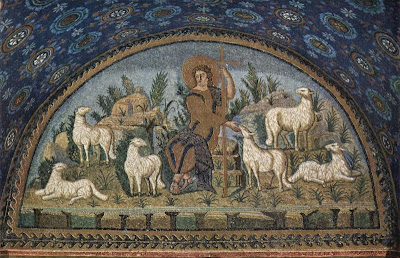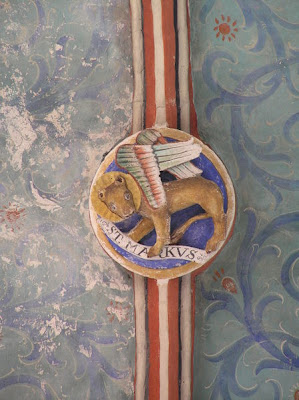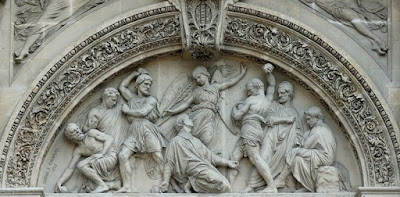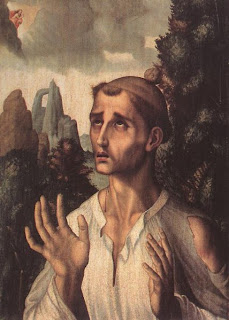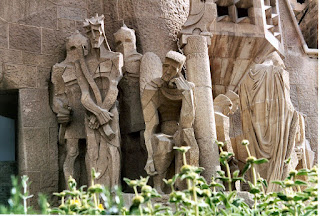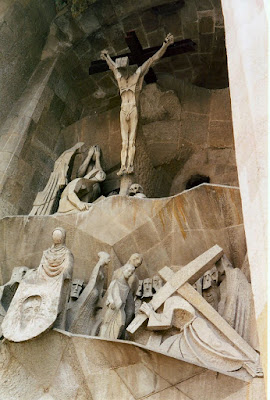3Easter (22 Apr 2007)
Ac 5. 27-32, 40b-41; Ps 30; Rv 5. 11-14; Jn 21.1-19Homily of Fr. Paul Panaretos, S.J.
Risen Is Real, Not RomanticEvery three years the second reading on Sundays of Easter is from the Book of Revelation. It isn’t about dating the world’s end. The Book of Revelation is about seeing. In its 22 brief chapters the phrase, “I saw,” appears more than 50 times. The Book of Revelation is one person’s graced vision of heaven. That disciple’s vision is not only the revelation about risen Jesus, the vision reveals risen Jesus:
“Do not be afraid. I am the first and the last, the one who lives. Once I was dead, but now I am alive forever and ever.”
One shape in which John saw the risen Lord,
the first and the last, the one who lives [forever though he] was dead, was the paschal Lamb. Paschal means “having suffered,” and John saw standing in the midst of the heavenly
throne, angels, living creatures and elders, the Lamb who was slain yet lives. That paschal Lamb is worthy of our worship and our very selves because that Lamb first won victory over evil and death. What is even more worthy of our worship is that this Lamb, standing alive though seemingly slain, assures us of his life and heritage now and offers us glimpses of heaven.
The Eucharist, the sacrament which sustains baptism, nourishes this vision and deepens it in all who let it. To see this vision, to soak oneself in it, consoles and comforts despite appearances to the contrary around us: war; hunger; pestilence; disease; vandalism; racism; and fears we can’t imagine afflicting others.
The first audience of the Book of Revelation suffered severely for their faith in the dead and risen Messiah Jesus. We differ from them in that, a good reason why we find this vision so alien, not to mention its very different symbolic world of expression. John wrote down his vision in order to comfort those suffering for their faith. That comfort does not remove suffering; rather, it assures us that the heritage of the Lamb is also ours. Jesus went through death, and
the God of our ancestors raised Jesus.
The message of this heritage is straightforward despite the elaborate imagery of the Book of Revelation. People have been and still are steered away from its straightforward message by its menagerie of beasts, angels, living creatures, elders, locusts, four horses, eagle, as well as earthquakes, plagues, eclipses and its doorway to heaven. The straightforward message of the Book of Revelation is this: God is in charge of the world. By no means a new message, yet how easily we forget it!

Throughout his ministry, Jesus warned that experiences of suffering mark the Christian life. Our suffering will probably pale in comparison with the first audience of the Book of Revelation, the disciples before it, as well as Jesus himself. Instead, subtle temptations surround us and vie for our allegiance not to heed and
obey God, that is, devote ourselves to God, but devote ourselves instead to what opposes Jesus’ ways.
The Book of Revelation prevents us from romanticizing the ways of Jesus. To forget that our risen Lord still carries the marks of his death romanticizes our Messiah Jesus. When we romanticize Jesus; his body, his church; our communion together in his Body and Blood; and the mission on which our Eucharistic communion commits us daily: we lose touch with the heritage of the paschal Lamb, thhttp://www2.blogger.com/img/gl.link.gife communion of his saints, and risen Jesus’ desire to nourish us.
Risen Jesus’ desire to nourish his friends is intimate and without pretense. We encountered the disciples still getting used to their risen Lord. Risen Jesus shattered the fear which imprisohttp://www2.blogger.com/img/gl.link.gifned them, yet they gravitated to their familiar, former fishing lives. Risen Jesus met them there once again.
In your daily 15 minutes with Jesus this week grow more alert to Jesus meeting you. Ask his disciples to present you to our risen Lord. They know well how to do that. Speak to Jesus about your life and how it moves toward and away from Jesus; of the temptations which vie for your allegiance. Be alert to how Jesus desires to communicate to you in light of your review of yourself. Close by saying slowly the
Lord’s Prayer to hear and to see more clearly risen Jesus communicating to you.
_______________________________________________________________
Wikiphoto of Risen Jesus is in the public domain. Wikiphoto of the paschal Lamb is in the public domain.
